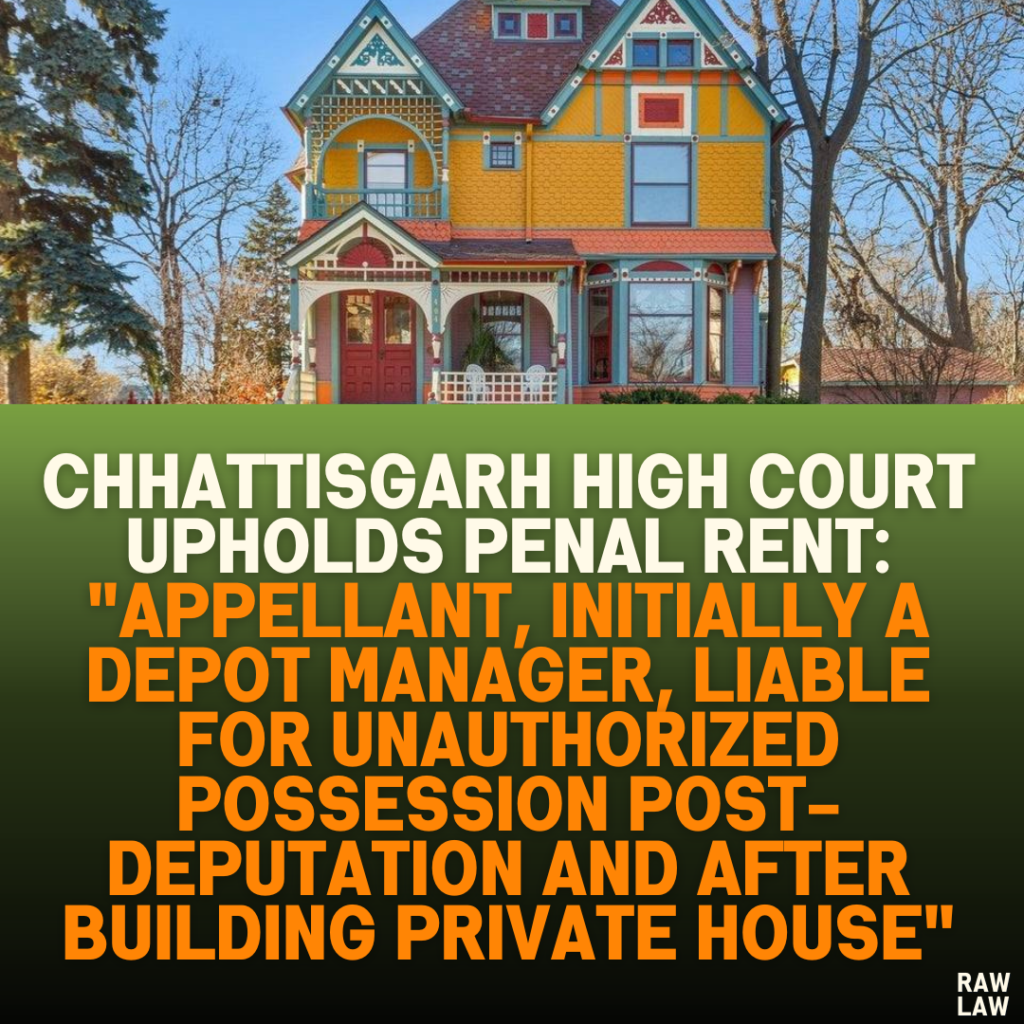Court’s Decision
The Chhattisgarh High Court dismissed the appellant’s writ appeal, affirming the Single Judge’s decision to uphold the imposition of penal rent for the unauthorized occupation of government housing. The court ruled that penal rent must be calculated starting from January 2010, after proper notice was issued in December 2009, and not from October 2008 as initially claimed by the respondents.
Facts
- Employment and Housing Allocation:
The appellant, initially employed as a Depot Manager in the Madhya Pradesh State Road Transport Corporation, was transferred to Raipur and allocated government housing in Shankar Nagar, Raipur. Over time, he was promoted to Divisional Manager. - Post-State Reorganization:
After the creation of Chhattisgarh in 2000, the appellant’s employment was transferred to the Chhattisgarh State Infrastructure Development Corporation (CIDC), which took over the assets and liabilities of the transport corporation. Later, the appellant was deputed to the Food, Civil Supplies, and Consumer Conservation Department in 2006. - Continued Occupation of Government Housing:
Despite constructing his own house in 2010, the appellant continued to occupy the government accommodation, which was contrary to departmental regulations. CIDC issued an order in 2009, deciding to recover departmental accommodations from employees on deputation or posted in other departments. - Eviction and Penal Rent:
In May 2012, CIDC directed the appellant to vacate the premises and pay a penal rent of ₹8,69,200 for the period between October 2008 and May 2012. The appellant contested this order, arguing the demand was excessive and arbitrary. - Writ Petition:
The appellant filed a writ petition challenging the penal rent order. The Single Judge partially allowed the petition, modifying the recovery period to start from January 2010 instead of October 2008. - Writ Appeal:
Dissatisfied, the appellant filed this writ appeal seeking further relief.
Issues
- Was the appellant justified in continuing to occupy the government accommodation post-deputation and after constructing a private house?
- Was the imposition of penal rent from October 2008, prior to a valid eviction notice, legally sustainable?
Petitioner’s Arguments
- Validity of Penal Rent:
The appellant argued that he was entitled to occupy the government accommodation while on deputation until July 2010 and the penal rent imposed prior to that period was unjustified. - Notice Requirement:
He contended that the first notice for vacating the premises was issued only in December 2009, making any recovery before that period arbitrary and contrary to principles of natural justice. - Excessive Rent Demand:
The appellant claimed the rent calculation was disproportionate to his salary category and should be reassessed at the prescribed government rate applicable to him.
Respondent’s Arguments
- Unauthorized Occupation:
The respondents asserted that the appellant’s occupation of the government accommodation after October 2008 was unauthorized, necessitating recovery of penal rent. - Compliance with Process:
They maintained that proper notices were issued, and the action was in line with departmental policies regarding unauthorized occupation.
Analysis of the Law
- Requirement of Notice for Penal Rent:
The court emphasized that imposition of penal rent requires a valid eviction notice, in line with the principles of natural justice. Without notice, retrospective recovery would be illegal. - Liability for Unauthorized Occupation:
While the appellant’s initial occupancy was authorized, his continued possession of government housing post-deputation and after constructing a private house was contrary to regulations, making him liable for penal rent. - Fairness in Rent Calculation:
The court noted that the calculation of penal rent must be proportionate and based on the period of unauthorized occupation after proper notice.
Precedent Analysis
The court relied on established principles of law requiring due process, including proper notice, before enforcing recovery. Although no specific precedents were cited, the judgment aligned with jurisprudence that safeguards against arbitrary recovery without adequate procedural compliance.
Court’s Reasoning
- Notice Issued in December 2009:
The court agreed with the Single Judge that the first valid notice to vacate the premises was issued in December 2009. Thus, recovery of penal rent could only start from January 2010. - Unauthorized Occupation:
It was undisputed that the appellant remained in unauthorized possession of the premises after his deputation ended and even after constructing his own house in the same city. - Modified Recovery Period:
The court upheld the Single Judge’s modification of the recovery period, ruling that penal rent prior to January 2010 was not enforceable due to lack of notice. - Assessment of Rent:
The court endorsed the assessment of rent at ₹7,950 per month for February 2006 to December 2009 and penal rent at ₹15,900 per month from January 2010 onward.
Conclusion
The High Court dismissed the appeal, holding that the Single Judge’s order was fair and in compliance with legal principles. The appellant must pay penal rent for the period of unauthorized occupation starting from January 2010, as assessed in the impugned order.
Implications
The judgment reaffirms the legal principle that recovery actions must be preceded by valid notice. It underscores the importance of following procedural safeguards, even in cases of unauthorized occupation, ensuring fairness in administrative actions. This ruling also serves as a reminder to employees occupying government accommodations about the legal consequences of non-compliance with allotment rules.



